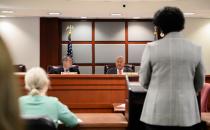Covid impacts make paying power bills harder; SELC is pushing for solutions
As coronavirus has devastated communities and reorganized home and work life, SELC attorneys have looked to use their expertise to address the new challenges many are facing. One front in this effort has been ongoing advocacy across the Southeast for solutions to ease the burden on struggling electric customers. Below are examples from two states of what this work has looked like.
Georgia
When the pandemic hit, SELC began working with Partnership for Southern Equity and a number of other groups to urge the state Public Service Commission to take action and
- consider debt forgiveness for income-qualified customers,
- provide customers additional time to pay off accumulated debt and
- ensure that the state’s largest utility, Georgia Power, has a detailed plan to help keep customers connected during this economic and public health crisis.
Following discussions with advocates and commission staff, Georgia Power began filing detailed data each month showing the number of customers at risk of disconnection.
Even with these efforts, Georgia Power has disconnected more than 66,000 customers for non-payment since the moratorium on disconnections was lifted in July, while an even greater number of customers have entered repayment installment plans to avoid losing service.
SELC and other advocates continue to push for solutions that will reduce energy burden for Georgians across the state, including shifting efficiency budgets to help those most in need manage monthly bills.
North Carolina
SELC attorneys worked with a broad spectrum of advocates in March to call on Governor Roy Cooper to ban disconnections of essential utility services for nonpayment during the COVID-19 state of emergency. The groups pushed for expanding access to comprehensive, bill-saving energy efficiency upgrades to more households earning a lower income.
“For customers experiencing the highest energy burdens, greater access to income payment plans with debt forgiveness paired with better energy efficiency programs can go a long way in protecting people from disconnections,” said Senior Attorney David Neal.
The North Carolina Utilities Commission instituted a shut-off moratorium for utilities under its jurisdiction and Gov. Cooper extended those protections by executive order to all other electric and water utilities. SELC was part of a successful effort in May to convince the Governor to extend his executive order through the end of July, and the commission’s moratorium expired at the end of August.
Today enhanced consumer protections and data reporting remain in place, and North Carolina utility customers have been allowed extended periods of time to repay past-due balances under the orders.
As the virus looks likely to continue disrupting life into 2021, SELC’s team of energy attorneys will be watching how power providers across the South treat customers who are struggling the most and advocating for more just practices.

